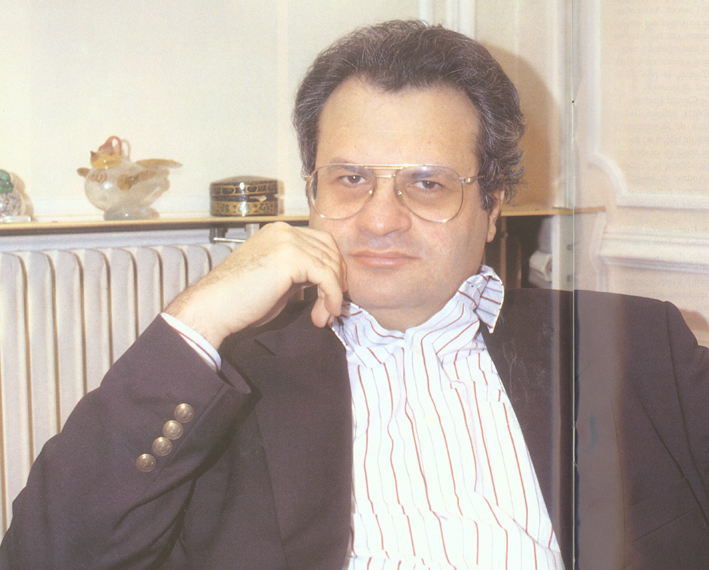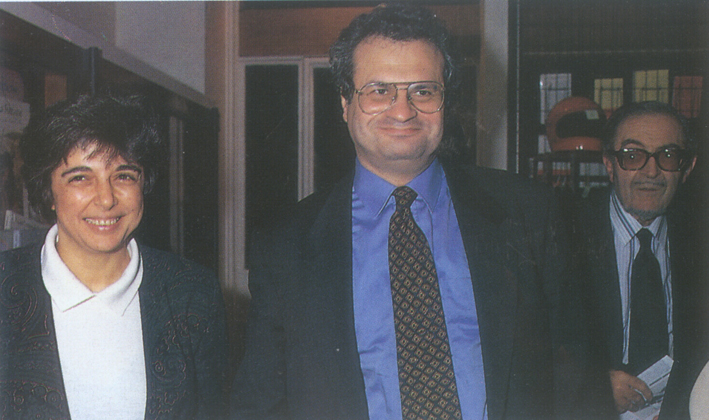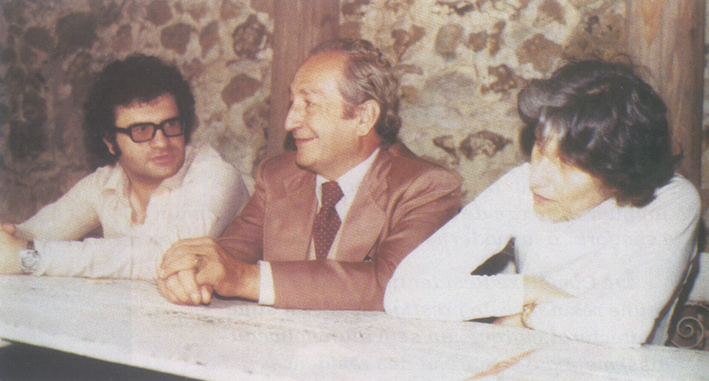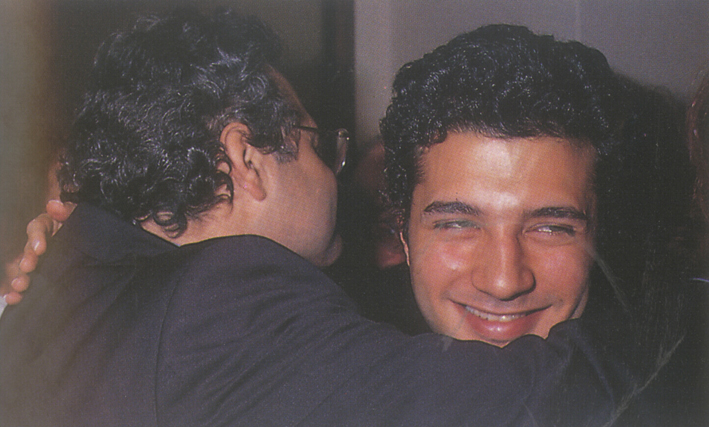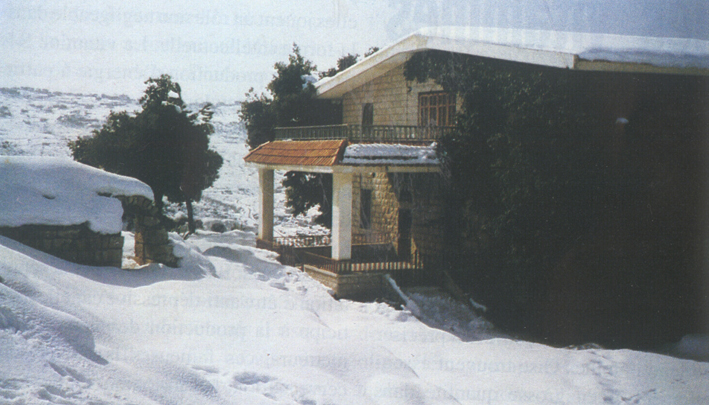Prestige issue 10, March 1994
He was interviewed, photographed, celebrated in all medias. At first, no doubt it will be said Prestige takes it a little late … Not really!
A few months after the Goncourt, we were curious to know if the prize had changed much in his life and the place it holds. And anyway, is it ever too late to find out differently, a writer who was able, despite the success, to remain equal to himself?
© Tony Hage
A talent solid as a certain rock …
What has the Goncourt changed in your life? «First of all, it generates much more activities. When I finished a book, I actually used to travel a bit in France and some other countries. But with the prize, it is four times more trips. For me, it is beneficial. So I have to get out of my isolation, meeting people, traveling. While three-quarters of the time, I live in complete isolation. On the other hand, the Goncourt is a very important step for me in that it gives a sense of what was there before you, incites to work even more, to write more. This is the most important. Currently, this is not the right time to think about the next book. I’ll start when I am on the island of Yeu (island in Vendée, ed).»
Can you explain to us long before this prize, the success of your work for a wide French audience? «It is fortunate that this is the case! I try to talk to people, to say things that seem important to me so that everyone without exception can read me.»
My books are not addressed to a minority, they are not intended to specialists. I was very fortunate that my books were well welcomed, I want to talk about a character like in Leon L’Africain; who has gone through several cultures, suffered a lot of transformations. For me, it was an emblematic figure that I wanted to evoke and starting from there, I spoke of countries where he lived: Spain, Morocco, Tunisia, Egypt. Then I got interested in Khayyam in Samarcande. Thanks to him, I dove inside the Iranian world where I discovered Mani for Les jardins de lumière. For Le premier siècle après Béatrice, this is about more current concerns, worries about changing the world, relations between people of different cultures, between North and South, bioethics. .. With Le Rocher de Tanios, it ”s not a character, but Lebanon: Perhaps I should have spoken about that another time, but I needed to let things mature. There I felt it was time to talk about it. And, as I said, the main character is the country. The other characters are imaginary. I was inspired by them just to build my novel.»
© Tony Hage
With his wife Andrée, his accomplice for nearly twenty-three years.
Le Rocher de Tanios: «For the first time, it is not about characters but about Lebanon»
You have traveled a lot in your books before returning to Lebanon? «Normal. When I was in Lebanon, I was working in An-Nahar, already interested in what was going on in the world, traveling a lot, following the events. I was in Vietnam, Ethiopia, Italy … What I write reflects the same: Spain, Morocco, Central Asia, Egypt, Iran … Many subjects interest me, concern me and not far from Lebanon. The topics I’ve approached or may approach are very varied. I will discuss both Lebanon and other civilizations, cultures … The vocation of Lebanon is to be open to the world. When a Lebanese talks about various things, he is even more Lebanese that he is interested in the world».
Precisely your next book, have you thought about that?«Right now, I can not think of it. I need to end travel and meetings before returning to the island where I will isolate as with my other works. One book requires approximately two years. In twelve years, I made six books. It is reasonable for someone who spends most of his time in writing. Then, when the book ispublished, I go meet people to promote it. For my new novel, I already have some notes, but I still have not really chosen the subject. I have to improve my research before opting for the idea that I am able to carry out. »
An idea I will develop gradually without scattering myself. I look for it at the end of my travels, including Lebanon soon to have the time required to successfully work and produce.»
© Archives Amin Maalouf
With his father, prominent journalist Rouchdi Maalouf, who died 13 years ago and his mother Odette.
You started to write in Arabic, why did you decide to write in French? «I did my studies in Arabic, French and English like most of the Lebanese. In Lebanon, I was used to write both in Arabic and French. Less in English, I confess. It is naturally that I passed from Arabic to French. The hazards of life made it that I write more in one language than in another. From 1971 to 1975 I wrote in Arabic. When I arrived in France, both, then more and more French. »
You have now cut the umbilical cord with the country?«No, never! In everything I have written, there was an interest in what was going on. From the Lebanese reality, I could think about other problems.
This is my eighteenth year in France. Otherwise, I was born in Lebanon in 1949, have completed all my studies, I started working at An-Nahar in 1971. I especially took care of international news. I was brought to travel a lot. The war broke out in 1975. Fifteen months Later, I just moved to France. There I worked in Jeune Afrique, continued to correspond with the country. In 1983, I wrote my first book, an essay: Les Croisades vues par les Arabes. In 1984, the first novel Léon L’Africain, then it was Samarcande, Le premier siècle après Béatrice, Les jardins de lumière and finally Le Rocher de Tanios.»
Why have you so quickly left Lebanon?«At the very beginning of the war, I lived in Ain el Remmaneh; there broke out the first incident. I felt the war close, because it touched my area. This upset my life. The next day I had to leave my house to go to my parents. On the other hand, I have always refused to identify with all that was happening. That was not the place of people whose speech mode is writing. So I left.»
You no longer returned?«Yes a dozen of times at least. Now, though, for some years I have no longer returned. I will as I have said, return for few weeks. But I do not know the exact date.»
What remains of your youth?«I had a pretty good childhood, tranquil. The first house I remember, was in Ras Beirut. I only remember the balcony; we could see the fields, the people who came to work the land. I have the impression of talking about a very old age. It was in the middle of the 50s I do not know if it still is cultivated, if this house still exists. It was located near a prison “Habs el Kalaa”. Even today, when I think of my childhood, I always see myself in this house that my parents, my three sisters and I left in 1962 or 1963. «I was going to Jamhour school; I also keep one great memory of the wonderful setting. Looking back, this time of my life seems like a golden age. Not just because it was childhood, but also because the country offered an extraordinary quality of life. At that time, never would I get the idea or even needed to leave my country, to go settle abroad although my university friends went perform their studies elsewhere. I’ve continued at the Faculty of Arts of Beirut and it seemed logical, of course. Unfortunately, the war tearings pushed me to leave. So from the first part of my life I keep an enjoyable image. And even though I was an only son, there was no relationship of authority within the family.»
There was a gentle atmosphere between my parents, my sisters and myself. It was possible to talk to my father who was pretty quiet. Obviously, during adolescence, there was a period of crisis, which was basically a good thing in itself»
Your father was a journalist; did he write novels?«He published a book of poems, some essays but no fiction. When I started writing, my father Rushdi was already dead. I was inspired by his stories and those of my grandmother to write Le Rocher de Tanios. I do not think it would come to him one day to write fiction, a short story or novel. Imagine, invent, write «lies», something he would not have liked to do; it would have felt like losing his seriousness, respectability. This is probably due to his journalistic background. For my part, although I started writing at age 37, I was always interested in the novel. I kept this desire. I like to imagine stories, build them. With this difference, I followed my father’s direction: writing ».
But don’t you think he would have been proud?«He had no hostile attitude towards the novel, he read it even he didn’t have the state of mind for writing.»
Ain El Kabou inspired you; have you lived there for long? «In fact, as it often happens in Lebanon, I’ve mostly spent my summer vacation. My last year in Lebanon during the bombing, I mounted a whole winter. After that, I went there a few times, not often.
If the fact of staying there a full winter inspired me Le Rocher deTanios? May be. But in general my father, my grandmother told me a lot about the village. These stories remained in my mind. In the novel all these stories are different because the imagination reigns in supreme.»
Would you isolate yourself in Ain El Kabou to write instead of Ile d’Yeu?«If I go to Ain El Kabou, it will be to meet friends, more than isolate myself. When a writer finds a place where he can write well, he should not change it.»
Your new life in France, how have you lived it? «Positively, in the best way possible. The first uncertain times passing, rebuild something was a good time. I worked a lot to exhaustion. Yet I have never ceased to follow what was happening in Lebanon. I have not tried to detach myself. I just wanted to lead a different life.»
You will soon celebrate the twenty-three years of your marriage, do you think your children will follow in your footsteps? “It’s a little early to tell. Rushdi is 21, Tarek 18 and Ziad 17. The eldest is preparing his law studies. Will he continue legal training or another? I do not know. Cadets are still in school.»
© Tony Hage
Two Maalouf generations Amin and his son Rushdi
© Archives Amin Maalouf
«A whole winter in Ain El Kabou». Ain: Yeu, the same term, another language!
While signing my copy, I noticed that you were looking for your pen: Do you have mania? «Yes, I have. I have often next to me amounts of pens of all colors that I use. I write on a special type of white paper, not another. When I write, I also need to have next to me several blocks of paper (about fifteen) even though I know I’m going to complete one during a month. «And I leave the pleasant company of Amin and Andrée who handles issues «down to earth» and who is the link between the island and Paris where the writer is isolated. We are left to wait for the next book. In two years. Interview by MARIANNE ABOU JAOUDE


